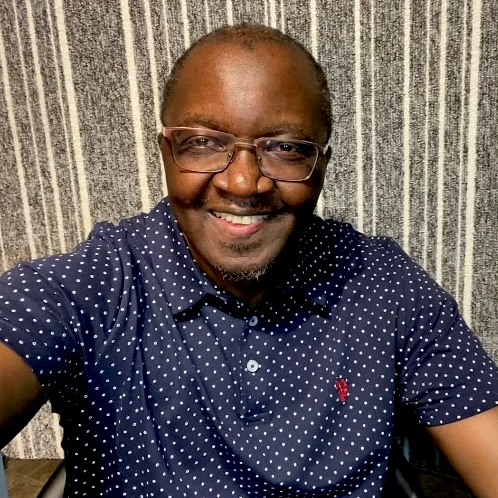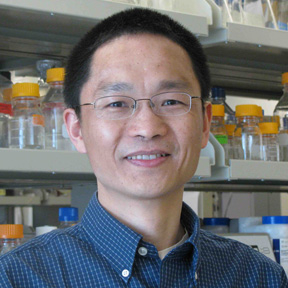 |
Dr. Deborah Anderson, BSc, PhD (Cancer Cluster Leader) Director of Discovery & Translational Research, Saskatchewan Cancer Agency Head, Division of Experimental Oncology, Dept of Oncology, and Associate Member Biochemistry, Microbiology & Immunology, University of Saskatchewan Office: Room 4D30.2 (306) 966-7038 deborah.anderson@saskcancer.ca |
The major focus of the Anderson lab is studying the role of the metastasis suppressor protein CREB3L1 in breast cancer progression. This transcription factor is frequency lost in advanced breast cancers, particularly of the triple negative subtype, and contributes to their metastatic properties. Google Scholar Link; Researchers Under the Scope Feature
|
|
Dr. M. Dean Chamberlain, BSc, PhD Research Scientist, Saskatchewan Cancer Agency |
The Chamberlain Lab is interested in the development of new tools and assays to improve the selection of treatment regimens for cancer patients. To do this we use a multitude of approaches to stratify how patients will respond to different cancer therapies, ranging from determining new biomarkers for cancer sub-classification to directly testing chemotherapies on patient-derived tumour organoids. Google Scholar Link
 |
Dr. Erique Lukong, BSc/BA, MA, MSc, PhD Faculty, Department of Biochemistry, University of Saskatchewan Office: Room 4D30.3 (306) 966-4586 erique.lukong@usask.ca |
Work in Dr. Lukong’s lab is centred on breast tumour kinase (BRK) and two other BRK family members, FRK and SRMS. BRK is overexpressed in the majority of breast carcinomas and tends to function as an oncogene, while FRK displays tumor suppressor activity in breast cancer. The cellular roles of SRMS are unknown. The Lukong lab is investigating the cellular and physiological roles, and the mechanisms of action and modes of regulation of all three kinases in breast cancer. The Lukong lab is also characterizing the diagnostic, prognostic and therapeutic potential of BRK and FRK in breast cancer. Google Scholar Link
Graduate student opportunities.
 |
Dr. Franco Vizeacoumar, BSc, PhD Senior Research Scientist, Saskatchewan Cancer Agency Associate Professor, Division of Experimental Oncology, Dept of Oncology and Associate Member, Dept of Pathology, University of Saskatchewan Office: Room 4D01.5 (306) 966-7010 franco.vizeacoumar@usask.ca |
A key message from the current genomic studies is that therapeutic approaches should aim at the genetic basis rather than the tissue of origin. This knowledge and the availability of highly selective inhibitors of gene products, promises personalized medicine through a genotype-directed cancer therapy. My lab is directly involved developing such a genotype-directed cancer therapy for solid tumors by applying a basic biological concept called synthetic lethality. In effect, any genetic alteration that can cause selective-lethality with an oncogenic or a tumor suppressor mutation can be potentially translated into a therapeutic target. Our long term goal is to build a synthetic lethal network that will enable us to understand the genetic dependencies of cancer cells and define key therapeutic targets. Google Scholar Link; Researchers Under the Scope Feature
Many training and employment opportunities.
 |
Dr. Yuliang Wu, BSc, MSc, PhD |
The laboratory of Dr. Wu aims to understand how protein changes can lead to breast cancer and Fanconi anemia, a genetic disease that often leads to leukemia and other types of cancer. Wu and his team are looking at the Fanconi anemia group J protein, which contributes to DNA repair. He has identified changes, or mutations, in the protein in cases of breast cancer or Fanconi anemia and is conducting further research to determine the potential structural defects. This knowledge is an important step toward possible therapies that target the mutated protein. Google Scholar Link
Graduate student opportunities.
 |
Dr. Jim Xiang, BSc, PhD, MD Senior Research Scientist, Saskatchewan Cancer Agency Professor, Division of Experimental Oncology, Dept of Oncology and Associate Member, Dept of Pathology, University of Saskatchewan Office: Room 4D30.1 (306) 966-7039 jim.xiang@saskcancer.ca |
Dr. Xiang’s lab is interested in studying cellular and molecular mechanisms for CD4 T cell help in CD8 cytotoxic T lymphocyte (CTL) responses and memory and developing novel exosome-targeted T cell-based immunotherapeutic vaccines for HER2-positive breast cancer and HIV-1 patients. Recently, Dr. Xiang’s group discovered the critical role of mannose-6-phosphate Receptor (M6PR) in regulation of T cell fate. Currently, his team is elucidating the molecular pathways for pro-survival cytokine-induced differential M6PR expression-regulated CTL contraction and memory. Google Scholar Link


